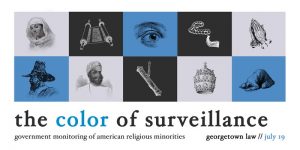Home
Use our global calendar of privacy events to locate an event near you.
FILTER BY

The U.S. Department of Health and Human Services (HHS) presents “Data Privacy in the Digital Age,” a Symposium featuring Latanya Sweeney as a Keynote Speaker and a slate of presenters who are privacy thought leaders from academia, government, and industry. Panelists will discuss privacy concerns on topics ranging from internet-connected devices and electronic medical records to big data analytics and blockchain technology. Attached please find a list of panels and panelists.
REMOTE ACCESS: www.HHS.gov/live
Conference attendees will be drawn from privacy professionals across the Federal government, industry, and academia. Additionally, CIPP-, CIPM-, and CIPT-certified individuals will be eligible to receive up to 6 CPE credits for attending the event.
Seating for the event is limited. The event will be live streamed on www.HHS.gov/live. To register for the “Data Privacy in the Digital Age” Symposium, please email [email protected] with your Name, Institutional Affiliation, Email Address, and preference as to in person or remote attendance (we will try to honor preferences for in person attendance, but cannot guarantee availability).
To obtain further information or request a reasonable accommodation, please email:[email protected].
Panel 1. Contemporary Health Privacy Challenges
Leo Beletsky, JD, MPH; Associate Professor of Law and Health Sciences, School of Law &
Bouvé College of Health Sciences, Northeastern University
Presentation: “From Panacea to Panopticon: Privacy and Prescription Drug Monitoring in the
Age of the Opioid Crisis”
Kate Black, JD; Privacy Officer and Corporate Counsel, 23andMe, Inc.
Zerina Curevac, JD; Associate, Squire Patton Boggs
Presentation: “A Framework for Notice and Choice in Online Consumer Genetics”
Sharona Hoffman, JD, LLM, SJD; Professor of Bioethics; Edgar A. Hahn Professor of Law;
Co-Director, Law-Medicine Center; Case Western Reserve University School of Law
Presentation: “The HIPAA Security Rule: Strengths and Vulnerabilities”
Kathryn Montgomery, PhD; Professor and Director of the Communication Studies Division,
School of Communication, American University
Presentation: “Health Wearables: Ensuring Privacy, Security, and Equity in an Emerging
Internet-of-Things Environment”
Panel 2. Privacy, Data Sharing, and Research
Deven McGraw, JD, LLM; Deputy Director for Health Information Privacy, Office for Civil
Rights; Acting Chief Privacy Officer, Office of the National Coordinator for Health Information
Technology; U.S. Department of Health and Human Services
Presentation: TBD
Kirsten Ostherr, PhD, MPH; Gladys Louise Fox Professor of English; Director, Medical
Futures Lab; Rice University
Presentation: “Trust and Privacy in the Ecosystems of User-generated Health and Medical Data”
Ameet Sarpatwari, JD, PhD; Instructor in Medicine at Harvard Medical School; Assistant
Director, Program On Regulation, Therapeutics, And Law (PORTAL)
Presentation: “Data Sharing that Enables Post-approval Drug and Device Research and Protects
Patient Privacy: Best Practice Recommendations”
Alexandra Wood, JD, MPP; Fellow, Berkman Klein Center for Internet & Society, Harvard
University
Presentation: “Elements of a New Ethical Framework for Big Data Research”
Page 2 of 3
Panel 3. Privacy Policy and Regulation
Idris Adjerid, PhD, MBA; Assistant Professor of Management, Mendoza College of Business,
University of Notre Dame
Presentation: “The Impact of Privacy Regulation and Technology Incentives: The Case of
Health Information Exchanges”
Jason Chung, JD, MSc; Senior Research Scholar, Sports and Society, NYU School of
Professional Studies.
Presentation: “Biometric Data Privacy Problems in Sports: Why the United States Needs a
National Privacy Regulator”
Lindsay Gladysz Madejski, JD, CIPP/G; Associate, Booz Allen Hamilton
Presentation: “Privacy and Security Considerations for Evidence Based Policymaking”
Efthimios Parasidis, JD, MBioethics; Associate Professor of Law and Public Health; Faculty
Affiliate, Center for Bioethics and Medical Humanities; The Ohio State University
Presentation: “Ethical and Legal Dimensions of a Risk-based Rubric for Data Privacy”
Panel 4. From Patient to Participant to Specimen to Data: Privacy Across the
Health Lifecycle
Andrew G. Shuman, MD; Assistant Professor, Division of Head and Neck Oncology,
Department of Otolaryngology–Head & Neck Surgery, University Michigan Health System; Co-
Director, Program in Clinical Ethics; Chair, Adult Ethics Committee and Consultation Service;
Center for Bioethics and Social Sciences in Medicine, University of Michigan Medical School;
Chief, ENT Section, Surgery Service, VA Ann Arbor Healthcare System
Presentation: Focusing on patient privacy
Kayte Spector‐Bagdady, JD, MBioethics; Assistant Professor, Department of Obstetrics &
Gynecology; Chief, Research Ethics Service, Center for Bioethics and Social Sciences in
Medicine; University of Michigan Medical School
Presentation: Dignitary Harms and the Privatization of Data
Nicolle Strand, JD, MBioethics; Assistant Professor, Bioethics; Assistant Director for
Research, Center for Bioethics, Urban Health, and Policy; Lewis Katz School of Medicine at
Temple University
Presentation: Focusing on patient privacy interests in shared data
Page 3 of 3
Panel 5. Privacy-preserving Tools, Technologies, and Methodologies
Adrian Gropper, MD; Chief Technology Officer, Patient Privacy Rights Foundation
Presentation: “Blockchain-linked Self-sovereign Technology for Information Sharing”
Abel Kho, MD, MS; Associate Professor, Northwestern University Feinberg School of
Medicine
Presentation: “Pragmatic Real World Applications of Privacy-preserving Record Linkage”
Bradley Malin, PhD; Professor of Biomedical Informatics, Biostatistics, & Computer Science;
Co-Director, Ph.D. Program in Big Biomedical Data Science; Co-Director, Center for Genetic
Privacy and Identity in Community Settings; Co-Director, Health Data Science Center; Director,
Health Information Privacy Laboratory; Vanderbilt University
Presentation: “An Open Source Tool for Game Theoretic Health Data De-identification”
featuring author, Jennifer E. Rothman, Professor of Law and Joseph Scott Fellow, Loyola Law School
Tuesday, April 3, 2018 at 12:00 pm
Berkman Center for Internet & Society at Harvard University
Harvard Law School campus
Wasserstein Hall, Milstein East A (Room 2036, second floor)
RSVP required to attend in person
Watch Live Starting at 12pm
(video and audio will be archived on this page following the event)

Across our country’s history – from the surveillance of the Separatists we now know as Pilgrims in 16th and 17th century England, to federal house raids and interrogations of early Mormons in the Utah Territory in the 19th century, to the 20thcentury surveillance of Jewish, Muslim, Quaker, and Sikh communities, to modern post-9/11 surveillance systems –government monitoring has long had a deep and disparate impact on American religious minorities.
The Color of Surveillance: Government Monitoring of American Religious Minorities will trace that history, and ask hard questions about what it means: Is modern surveillance consistent with the intentions of the American founders – or, for that matter, the events that precipitated the migration of English Separatists to the New World on the Mayflower? Do modern counterterrorism initiatives appropriately protect civil rights and civil liberties? How are local communities, advocates, and artists responding to these challenges?
Now in its third year, The Color of Surveillance, organized by the Center on Privacy & Technology at Georgetown Law, convenes academic, policy and government experts alongside local and community activists and artists. Prior speakers have included the Pulitzer-winning biographers of Martin Luther King, Jr. and W.E.B. DuBois, Guggenheim award-winning artists, and the general counsel of the Federal Bureau of Investigation.
Welcome & Introduction to The Color of Surveillance: Government Monitoring of Religious Minorities
8:45 – 9:00am
Dean William Treanor, Georgetown Law
Alvaro Bedoya, Center on Privacy & Technology at Georgetown Law
Elizabeth I to the Early 20th Century
9:00 – 10:15am
“Hunted”: 16th & 17th Century Surveillance of Pilgrims
John Coffey, University of Leicester
Is the United States a Christian Nation?
Brooke Allen, Bennington College
“Mohammedan Barbarism”: The Campaign Against Early Mormons
J. Spencer Fluhman, Brigham Young University
The Military Intelligence Division and American Jews
Alvaro Bedoya, Center on Privacy & Technology at Georgetown Law
The FBI and the Moorish Science Temple of America
Sylvester A. Johnson, Virginia Tech
BREAK
10:15 – 10:30am
The 1960s to the Aftermath of 9/11
10:30 – 12:05pm
J. Edgar Hoover, Black Clergy, and Martin Luther King, Jr.
Lerone A. Martin, PhD, Danforth Center on Religion and Politics at Washington University in St. Louis
The Feeling of Being Watched: A Filmmaker’s Response
Assia Boundaoui, The Inverse Surveillance Project
Rabia Boundaoui
Xiangnong (George) Wang (moderator), Center on Privacy & Technology at Georgetown Law
Post-9/11 Watchlists
Hina Shamsi, ACLU National Security Project
Community Reflections
Members of the Center for Media Justice’s National Delegation of MASA Community Activists
LUNCH BREAK
12:05 – 1:00pm
Life in Affected Communities
1:00 – 2:45pm
A Conversation on Countering Violent Extremism
Faiza Patel, Brennan Center for Justice
Ayaan Dahir, Young Muslim Collective
Eric Rosand, The Prevention Project
William Braniff, START, University of Maryland
Alvaro Bedoya (moderator), Center on Privacy & Technology at Georgetown Law
“Mosque Crawlers” and the Raza and Hassan cases
Asad Dandia, NYU Graduate Student
Farhaj Hassan, Muslims United For Justice
Laura Moy (moderator), Center on Privacy & Technology at Georgetown Law
“If they should come for us”: A Poet’s Response
Fatimah Asghar
Renata Barreto (moderator), Center on Privacy & Technology at Georgetown Law
BREAK
2:45 – 3:00pm
Community Action
3:00 – 5:25pm
Organizing after Raza
Fahd Ahmed, DRUM – Desis Rising Up & Moving
Stopping the Digital Muslim Ban: A Case Study
Rachel Levinson-Waldman, Brennan Center for Justice
Natasha Duarte, Center for Democracy & Technology
Yolanda C. Rondon, American-Arab Anti-Discrimination Committee
Steven Renderos, Center for Media Justice
Harrison Rudolph (moderator), Center on Privacy & Technology at Georgetown Law
Organizing in Silicon Valley
Maya Berry, Arab American Institute
Michelle Miller, Coworker.org
Jameson Spivack (moderator), Center on Privacy & Technology at Georgetown Law
Organizing Locally
Brian Hofer, Oakland Privacy
Religious Surveillance and Intersectionality
Brandi Collins-Dexter, Color Of Change
“Stealth Wear”: An Artist’s Response
Adam Harvey
Closing Remarks
5:25 – 5:30pm
Reception to follow in Hart lobby
Speakers:
- Fahd Ahmed of Desis Rising Up and Moving, a grassroots organizer on the issues of racial profiling, immigrant justice, and police accountability
- Professor Brooke Allen of Bennington College, author of Moral Minority: Our Skeptical Founding Fathers, a New York Times notable book
- Poet Fatimah Asghar, author of If They Come For Us & co-creator of the Emmy-nominated web series Brown Girls
- William Braniff of the National Consortium for the Study of Terrorism and Responses to Terrorism (START), studies CVE and alternative counterterrorism approaches
- Filmmaker Assia Boundaoui, director of The Feeling of Being Watched, a “riveting” account (New York Times) of surveillance of a suburban Muslim community in the 1990s
- Professor John Coffey of the University of Leicester, a scholar of Tudor and Stuart-era surveillance of the Puritans we now know as Pilgrims
- Brandi Collins-Dexter of Color Of Change, a civil rights advocate on media, environmental justice, and economic issues
- Ayaan Dahir of the Minneapolis Young Muslims Collective, a Somali American youth leader and civil liberties advocate
- Asad Dandia, M.A. candidate in Middle Eastern Studies at New York University and plaintiff in the Raza v. NYPD case
- Natasha Duarte of the Center for Democracy & Technology, author of Mixed Messages: The Limits of Automated Social Media Analysis
- Professor Spencer Fluhman of Brigham Young University, author of “An ‘American Mahomet’: Joseph Smith, Mohammad, and the Problem of Prophets in Antebellum America”
- Artist Adam Harvey, creator of Stealth Wear, a clothing collection “inspired by traditional Islamic dress… reimagined in the context of drone warfare”
- Syed Farhaj Hassan, a Sergeant in the U.S. Army Reserve and lead plaintiff in the Hassan v. City of New York case
- Brian Hofer of Oakland Privacy and the Privacy Advisory Commission of the City of Oakland, an advocate for local anti-surveillance legislation
- Professor Sylvester Johnson of Virginia Tech’s Center for the Humanities, co-editor of The FBI and Religion: Faith and National Security before and after 9/11
- Rachel Levinson-Waldman of the Brennan Center for Justice, co-coordinator of the Immigrant Surveillance Working Group
- Professor Lerone Martin of the John C. Danforth Center on Religion and Politics, a scholar on the FBI’s mobilization of African American clergy to discredit Dr. Martin Luther King, Jr.
- Michelle Miller of coworker.org, leading facilitator of tech sector employee activism and mobilization
- Faiza Patel of the Brennan Center for Justice, author of an in-depth critique of federal CVE programs
- Steven Renderos of the Center for Media Justice, co-organizer of a grassroots petition to IBM opposing the company’s interest in ICE’s “Digital Muslim Ban”
- Yolanda Rondon of the American-Arab Anti-Discrimination Committee, a civil rights attorney critical of DHS surveillance initiatives
- Eric Rosand of the Prevention Project: Organizing Against Violent Extremism, a non-resident Senior Fellow at Brookings, and a former State Department senior CVE official
- Hina Shamsi of the American Civil Liberties Union, which is challenging watchlists as unfair and discriminatory


